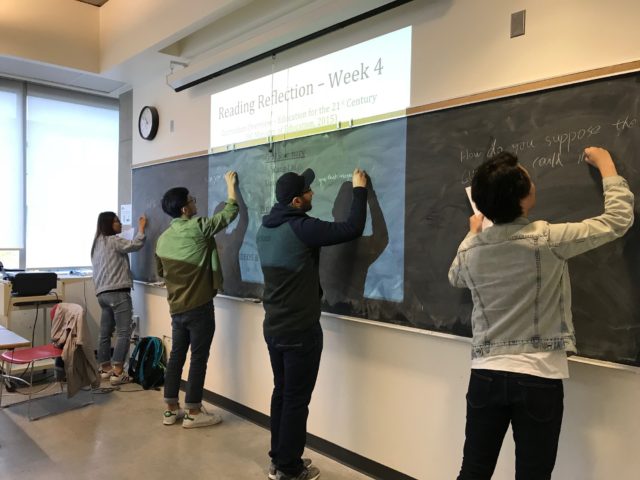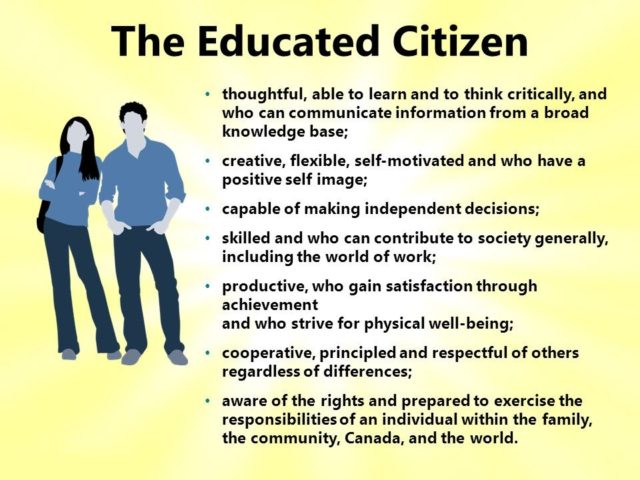A Full Class

Week 4 – EDUC471D100 – September 29, 2017
I love this photo. We are delving into BC’s New Curriculum and what it entails. In this course, students have the opportunity to sign-up for various participation activities. One of those activities involves reading reflections. This week, two students were responsible for the oral presentation of the article and two of them were responsible for the written summary. In this photo, these students are writing on the board questions they have for themselves and the class to discuss regarding the article we read. I love this.
I also loved how the student-led warm-up activity took a shift from “getting to know you” to “getting to know you better” with team building and problem solving. Students were divided into groups of 5 and given a handful of straws and a metre of masking tape. The challenge was to build a the tallest free-standing structure they could within a given time frame with the materials they were given. Wow. I could not have designed or planned for this better. This activity best exemplified the development of the Core Competencies of THINKING and COMMUNICATION. I was so impressed with the activity and final products.
With the introduction to BC’s New Curriculum, the topic I wanted to focus on this week was the concept and policy of “The Educated Citizen.” The image below shows the main points of The Educated Citizen as seen in the Statement of Education Policy Order – Mandate of the School System of British Columbia (1989). BC’s New Curriculum (2016) and its development was focused on The Educated Citizen and how it can be achieved via the curriculum. It was believed that the curricula developed since the Education Policy Order (1989) did not satisfy the vision The Educated Citizen. Students were asked to reflect on what it means to be an educated citizen and if schools helped them to be one.

What does it mean to be an educated citizen?
For me, it’s the ability to think critically and creatively, to communicate with others effectively, and to find my passions, strengths, and interests. I feel that BC’s New Curriculum’s CORE COMPETENCIES help me to become an educated citizen.
In what ways have you met the criteria of BC’s Educated Citizen?
I feel as a 47-year old adult, I am an educated citizen. However, after my K-12 education experience, I am not certain if I satisfied all, if not some, of these bullets as seen above. I think I achieved the second and third last bullet… being productive and cooperative. I believed that I learned this from curling (aka. sport).
In what ways have you NOT met the criteria of BC’s Educated Citizen?
As an adult, I wished I was more consistent with “striving for physical well-being.” Going into that would be another blog entry, but I am left wondering where did I learn how to the rest of the bullets or did I learning it in K-12 and improved on it over time. I am curious what my students wrote in their journal reflections.
In what ways do you believe that BC’s New Curriculum will satisfy the characteristics of an Educated Citizen?
I mentioned this in my first response… I believe it will be the CORE COMPETENCIES. The curricular competencies feed into the Core Competencies and content serves as a vehicle to develop the competencies. Furthermore, student self-reflection, formative assessment, and Communicating Student Learning will compliment BC’s New Curriculum to help students to become metacognitive and understand their strengths, weakness, and appropriate learning adaptations to thrive in schools and beyond.
My Reflection:
My students remind me that students should be integral to their learning and leading their learning. They also remind me the power of the teacher as facilitator. The class spent much of their in class discussion on EDUCATION FOR ALL and what would the learning experiences look like for those with learning challenges if integrated with students how are university bound, for example. In essence, they were discussing and deliberating the idea of INCLUSIVE CLASSROOMS. Not only do these conversations inform me as to what we will be doing next class, but also it lined up to the Wildcard Activity chosen by the student this week. What did she present about? DIVERSITY. We discussed cultural diversity and cognitive diversity. I could not have planned that any better. I was so shocked how the student led activities, class content, and group discussions were interconnected. It seemed uncanny or serendipitous. Although it was not explicitly “planned” by me, the teacher, it was absolutely planned such that the topics and conversations about education, curriculum, and learning are natural fits. Too cool!